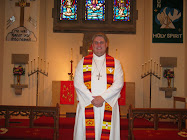
The majority of pastors I know all share 1 common trait: They are big fans of fantasy, science fiction, and/or superheroes. Though I'm not as hardcore as I could be (and used to be), I can be found in that third camp. Superheroes offer us yet another way to examine our culture and ourselves.
That is the premise of Greg Garrett's book, Holy Superheroes! Exploring the Sacred in Comics, Graphic Novels, and Film." He states that superheroes give us another way to examine ourselves and our myths: "In the process of telling their stories of human-and superhuman- characters, comics deal with issues near and dear to our hearts:faith, hope, belief, guilt, justice, redmption, ultimate meaning, ultimate evil". (p.7)
Garrett explores the spiritual issues of a wide variety of comics and superheroes. And he does so as one who truly loves comics. He examines such issues as truth, power, heroism, vigilantism, evil, ethics, violence, and others.
Particularly helpful is the appendix that Garrett includes. It's a list of 25 graphic novels which Garrett referenced and recommends. Granted, not all of them deal with superheroes. But, it is a worthwhile list. Not only does he list these graphic novels, he gives a brief synopsis.
I'm not sure how much this book will help you in your ministry, but it is a good read. If nothing else, it may help with sermon prep. That is, it may help strengthen illustrations, or provide new possibilities for illustration.
What about those of you who are not fanboys, or even casual fans of the genre? There are possibilities for you as well in the book. It may strengthen bonds between the comics enthusiast member and yourself, if you are not already a comics/superhero fan. Att he bare minimum, it will help you relate better to other pastors who describe themselves as fans.
The book is a quick read, and well-worth it.

